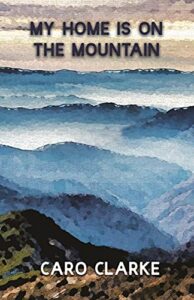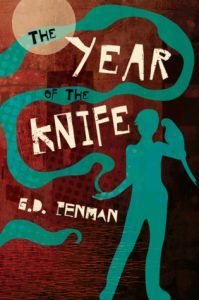If I were going to throw a book down into the middle of a fray between Romance readers and Lit Fic lovers, it would be My Home Is on the Mountain by Caro Clarke. This novel is absolute proof that you can have it all. You do NOT have to choose. You do NOT have to suffer (okay, maybe a little suffering, there’s angst aplenty, but you don’t have to endure the pain for an eternity). You, my friend, can read exceptional prose and get the HEA of your dreams. (Cue Oprah doling out Happy Endings to the readers.)
As though it was plucked straight out of the depths of classic Southern literature, Clarke’s novel is set in Eastern Tennessee in the early 1930’s. As someone who grew up in the south and read my fair share of Southern authors, heaps of Faulkener with a side of Zora Neale Hurston, this book was right up my alley from the start. The novel focuses on the relationship between Cecilia Howison, a privileged young woman from a wealthy, influential Southern family, and Airey Fitch, a local fiddler and hard working young woman living up in the Smoky Mountains. Her family is rich in land, but otherwise destitute. Major themes in this novel include economic inequality, exploitation of the lower classes, religion (specifically Christianity), and societal expectations around gender and sexuality.
One of the highlights of the book for me is that it plays with language and dialect in ways that any self-respecting word nerd should eat up with a spoon. Reference to regional mountain dialect and the perception of words spoken is something the author plays with throughout the book, as well as how language relates to class and education. There is so much to unpack and explore in the novel that I’ve barely mentioned the romantic entanglements of our two MCs, Cecilia and Airey. Their budding friendship is based on Cecilia’s desire to show the world that Airey Fitch is an undiscovered violin prodigy, though she maaay have some ulterior motives as she’s a bit sweet on Airey from the very start.
As the two women explore their relationship further, we start to wade into the waters of religion (with various interpretations) and the societal pressures of the time. We see their individual world views and how they’re shaped by their beliefs in ways you may not expect. But as you might have guessed, the relationship is fraught with fear of societal repercussions and looks doomed from the start. But I’ll remind you, this is a romance. Fear not.
One last thing to say about Clarke’s writing: this was a well researched, and I mean, really thoroughly researched novel. After reading it I went to the author’s website for her book, which details her notes chapter by chapter, with pictures and information on everything from clothing to cars. It is fascinating and I highly recommend you at least scan it a bit during reading, as it includes music as well. Airey can play just about anything on her violin, from old time standards popular in that time to Dvořák and Bach. Descriptions of Airey’s music are well executed, and if you want to listen along, some of it can be found on the website. (Be advised though, the site contains spoilers, so don’t skip ahead.)
10/10 – Now if only someone would come along and make this into a movie!


